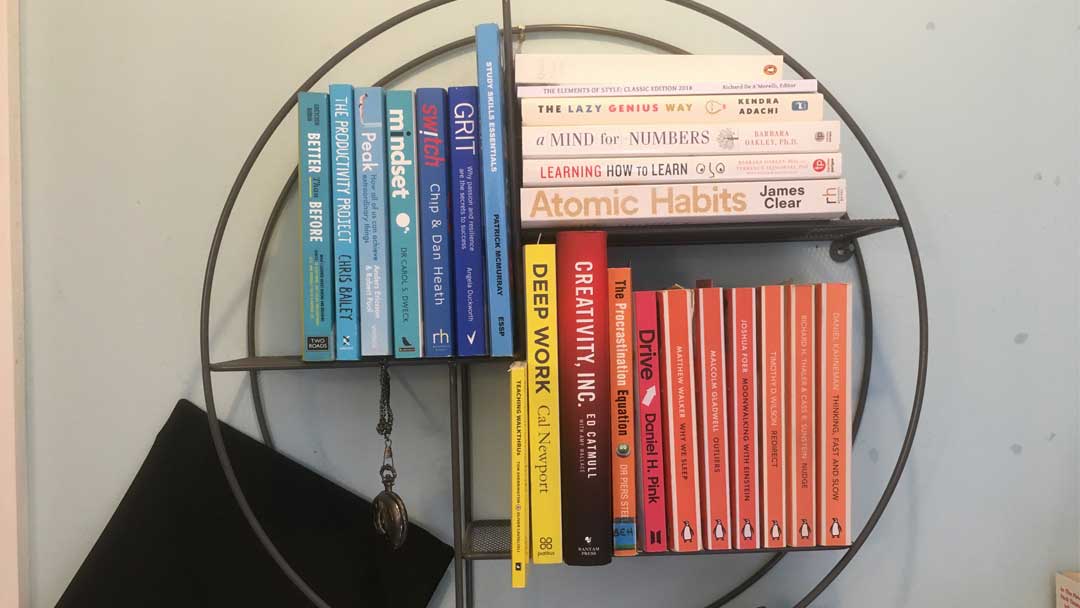Effective study techniques are essential for mastering any subject or skill. The way you study can make a big difference in how well you retain information and apply it when needed. The right study methods can boost your learning. They help with exam prep, skill-building, and staying organized. This guide will explore some of the best books on study techniques. Each offers practical ways to improve focus, boost memory, and learn more efficiently. These books offer insights into various techniques. They cover time management, active recall, mind mapping, and note-taking. They can help you find a method that works best for you.
10 Best Books on Study Techniques:
- Make It Stick: The Science of Successful Learning by Peter C. Brown, Henry L. Roediger III, and Mark A. McDaniel
- The Study Skills Handbook by Stella Cottrell
- Deep Work: Rules for Focused Success in a Distracted World by Cal Newport
- How to Study by Ron Fry
- The Pomodoro Technique by Francesco Cirillo
- Atomic Habits: An Easy & Proven Way to Build Good Habits & Break Bad Ones by James Clear
- The Art of Learning: A Journey in the Pursuit of Excellence by Josh Waitzkin
- The 7 Habits of Highly Effective People by Stephen R. Covey
- Learning How to Learn: How to Succeed in School Without Spending All Your Time Studying by Barbara Oakley
- Mindset: The New Psychology of Success by Carol S. Dweck
“Make It Stick: The Science of Successful Learning” by Peter C. Brown, Henry L. Roediger III, and Mark A. McDaniel
Make It Stick explores the science of effective learning, questioning the efficiency of traditional study methods. The authors, experts in cognitive psychology, explain key learning principles based on extensive research, emphasizing active recall, spaced repetition, and retrieval practice. These methods enhance long-term memory and focus on self-testing, struggling to learn, and understanding study topics. While this book is a must-read for improving study habits, it also offers valuable insights for students studying accounting, making it one of the best books for accounting both academic subjects and practical skills.
“The Study Skills Handbook” by Stella Cottrell
The Study Skills Handbook by Stella Cottrell is a complete guide. It gives practical advice to students at all levels. It helps them master study skills. The book covers time management, reading strategies, note-taking, memory techniques, and effective writing. It has exercises, tips to improve focus, and ways to work better on school tasks. This book is unique. It helps students create a study plan that suits their learning style. It offers clear, actionable advice. It’s a great resource for students who want to improve their grades.
Deep Work: Rules for Focused Success in a Distracted World” by Cal Newport
Deep Work by Cal Newport is not about study techniques. But, it has insights on maximizing focus and productivity, which are key to studying. Newport argues that, in today’s distracting world, deep, focused work is rare. He outlines strategies for creating periods of focused, high-concentration work. These include time blocking, reducing distractions, and embracing boredom. This book offers a framework for students distracted by distractions. It can help them build deep work habits. These habits can greatly improve their study effectiveness.
“How to Study” by Ron Fry
How to Study is a practical, step-by-step guide. It breaks the study process into manageable tasks. This book, by renowned author Ron Fry, offers strategies for time management, note-taking, memory, and exam prep. The book gives tips for staying motivated and handling common academic challenges. This book’s simple, clear approach is perfect for students. It will give them a solid foundation in study skills.
“The Pomodoro Technique” by Francesco Cirillo
The Pomodoro Technique is a time management method. It is popular with both students and professionals. Francesco Cirillo developed the technique. It involves working for 25-minute, focused intervals, followed by short breaks. This method boosts focus and prevents burnout. It’s ideal for students who struggle to concentrate during long study sessions. Cirillo’s book explains the Pomodoro Technique. It also gives tips for using it in your study routine.
“Atomic Habits: An Easy & Proven Way to Build Good Habits & Break Bad Ones” by James Clear
Atomic Habits by James Clear isn’t just about studying. But, it gives great insights. Small habits can lead to big results. The book shows how to create good habits. It also explains how to eliminate distractions and optimize your environment for success. For students, this means a consistent study routine. It also means improved focus and no procrastination. Clear’s habit stacking advice can help those who struggle to study consistently. It emphasizes making small, steady improvements.
“The Art of Learning: A Journey in the Pursuit of Excellence” by Josh Waitzkin
In The Art of Learning, Josh Waitzkin, a former chess prodigy and martial artist, shares his method. The book has insights on a growth mindset for learning. It also teaches how to cultivate deep concentration. Waitzkin discusses three things. First, embrace challenges. Second, use failures as learning opportunities. Third, develop resilience in the face of setbacks. The book offers students a unique view on learning. It stresses mental toughness and strategic thinking.
“The 7 Habits of Highly Effective People” by Stephen R. Covey
The 7 Habits of Highly Effective People by Stephen Covey is a classic in development. The book isn’t about study techniques. But, it offers a way to be more effective in all areas of life, including studying. Covey’s principles can greatly help students improve their grades. They should prioritize important tasks, act on their goals, and stay positive. The book stresses personal responsibility and self-discipline. They are key to successful studying.
“Learning How to Learn: How to Succeed in School Without Spending All Your Time Studying” by Barbara Oakley
Learning How to Learn by Barbara Oakley is based on a popular online course. It offers simple, effective strategies for mastering learning. Oakley covers memory techniques, focused practice, and tackling tough concepts. The book also includes tips for overcoming procrastination and staying motivated. Oakley’s clear, concise writing helps readers apply these techniques to their study routines. It is an excellent resource for students at any level.
“Mindset: The New Psychology of Success” by Carol S. Dweck
Mindset by Carol Dweck examines “fixed” vs. “growth” mindsets. It shows how they affect learning and achievement. Dweck’s research shows that a growth mindset helps students succeed. It is the belief that abilities can improve with effort. The book offers strategies to develop a growth mindset. It helps overcome self-doubt and fear of failure. This book gives students a strong way to build a mindset for academic success.
FAQs:
What is the most effective study technique?
The best study method varies by person. But, research shows that active recall, spaced repetition, and retrieval practice work well. These techniques help reinforce learning and improve long-term retention.
How can I avoid procrastination while studying?
To avoid procrastination, break your study sessions into smaller chunks. Schedule breaks between them. The Pomodoro Technique is a popular method. It promotes short, focused work sessions followed by breaks. Additionally, eliminating distractions and setting clear goals can help maintain focus.
How can I improve my concentration while studying?
To improve concentration, use a mix of techniques. Create a distraction-free study space. Set specific goals. Practice deep work habits. Mindfulness and meditation can also help increase focus and reduce mental fatigue.
Conclusion:
The right study techniques can boost your grades. The books above offer great tips on how to study better. These books offer research-backed strategies to help you learn. They can enhance your focus, improve your memory, and help you study better. By using and adapting these techniques, you can be a more efficient, confident, and student.

